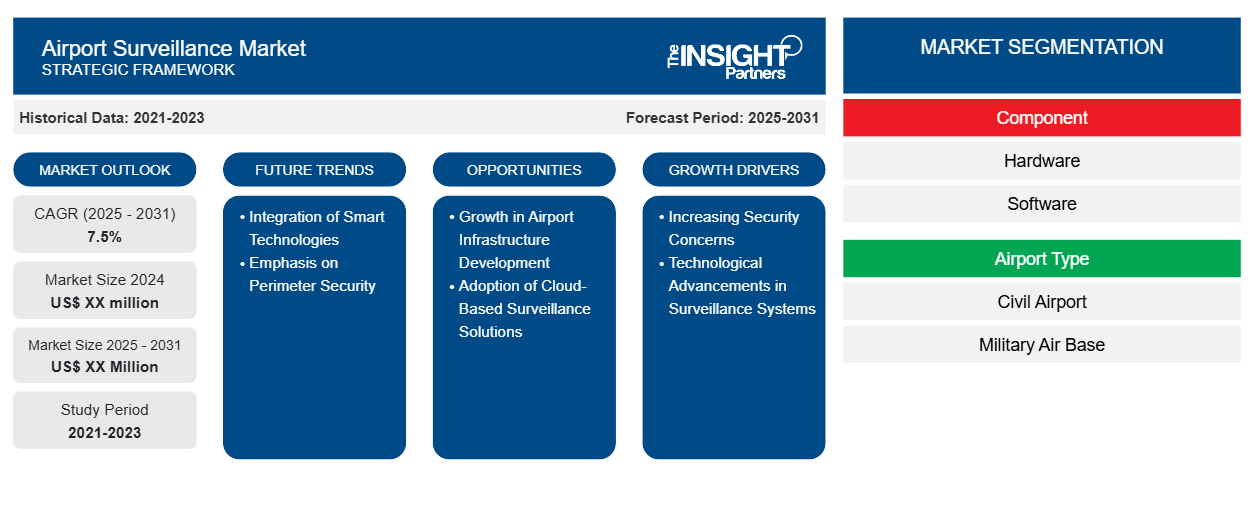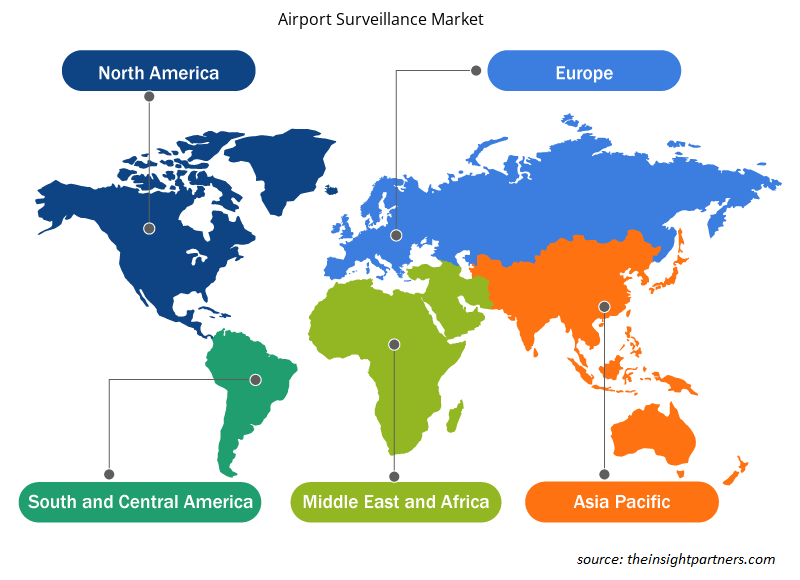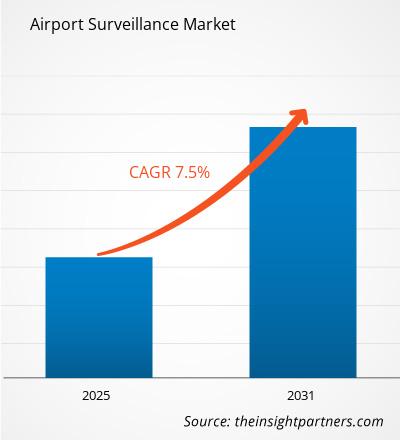The Airport Surveillance Market is expected to register a CAGR of 7.5% from 2025 to 2031, with a market size expanding from US$ XX million in 2024 to US$ XX Million by 2031.
The market is segmented into by Component, Airport Type, and Application Area. The Component segment is divided into Hardware, Software. Based on Airport Type, the global Airport Surveillance market is segmented into Civil Airport, Military Air Base. Based on Application Area, the market is segmented into Outdoor, Indoor.
Purpose of the Report
The report Airport Surveillance Market by The Insight Partners aims to describe the present landscape and future growth, top driving factors, challenges, and opportunities. This will provide insights to various business stakeholders, such as:
- Technology Providers/Manufacturers: To understand the evolving market dynamics and know the potential growth opportunities, enabling them to make informed strategic decisions.
- Investors: To conduct a comprehensive trend analysis regarding the market growth rate, market financial projections, and opportunities that exist across the value chain.
- Regulatory bodies: To regulate policies and police activities in the market with the aim of minimizing abuse, preserving investor trust and confidence, and upholding the integrity and stability of the market.
Airport Surveillance Market Segmentation
Component
- Hardware
- Software
Airport Type
- Civil Airport
- Military Air Base
Application Area
- Outdoor
- Indoor
Geography
- North America
- Europe
- Asia-Pacific
- South and Central America
- Middle East and Africa
You will get customization on any report - free of charge - including parts of this report, or country-level analysis, Excel Data pack, as well as avail great offers and discounts for start-ups & universities
Airport Surveillance Market: Strategic Insights

- Get Top Key Market Trends of this report.This FREE sample will include data analysis, ranging from market trends to estimates and forecasts.
Airport Surveillance Market Growth Drivers
- Increasing Security Concerns: The growing emphasis on airport security due to rising terrorism threats and criminal activities is a primary driver for the airport surveillance market. Governments and airport authorities are implementing stringent security measures to protect passengers, aircraft, and airport infrastructure. This has led to the adoption of advanced surveillance systems, including video surveillance, access control systems, and biometric identification technologies. Enhanced security protocols necessitate the deployment of comprehensive surveillance solutions, driving demand for sophisticated airport monitoring systems.
- Technological Advancements in Surveillance Systems: Continuous advancements in surveillance technology, such as high-definition (HD) cameras, thermal imaging, and artificial intelligence (AI), are significantly influencing the airport surveillance market. Modern surveillance systems now incorporate features like facial recognition, motion detection, and video analytics, which enhance the effectiveness of monitoring and threat detection. These technological innovations allow for improved situational awareness and faster response times, making them essential components of airport security infrastructure.
Airport Surveillance Market Future Trends
- Integration of Smart Technologies: A significant trend in the airport surveillance market is the integration of smart technologies, such as the Internet of Things (IoT) and AI, into surveillance systems. IoT-enabled devices allow for real-time data collection and communication among various surveillance components, enhancing overall system efficiency. AI-powered analytics can process vast amounts of data from surveillance feeds to identify potential threats and anomalies automatically. This trend towards smart surveillance systems is transforming airport security operations, making them more proactive and effective.
- Emphasis on Perimeter Security: There is an increasing focus on perimeter security as a critical aspect of airport surveillance. Airports are investing in advanced perimeter intrusion detection systems (PIDS) that utilize technologies such as radar, motion sensors, and video analytics to monitor the airport's boundaries. This trend highlights the importance of protecting airport perimeters against unauthorized access and potential threats, reinforcing the need for comprehensive surveillance solutions that cover all aspects of airport security.
Airport Surveillance Market Opportunities
- Growth in Airport Infrastructure Development: The expansion and modernization of airport infrastructure globally present significant opportunities for the airport surveillance market. As new airports are constructed and existing ones are upgraded, there is an increasing demand for advanced surveillance systems to ensure security and operational efficiency. Companies that offer innovative surveillance solutions tailored to meet the unique requirements of different airport environments can capitalize on this growth.
- Adoption of Cloud-Based Surveillance Solutions: The adoption of cloud-based surveillance solutions is becoming increasingly prevalent in the airport surveillance market. Cloud technology enables airports to store and manage large volumes of surveillance data efficiently, facilitating easier access and sharing among security personnel. Additionally, cloud-based systems offer scalability and flexibility, allowing airports to expand their surveillance capabilities as needed without significant infrastructure investments. This trend is expected to drive growth in the market as more airports transition to cloud-based surveillance systems.
Airport Surveillance Market Regional Insights
The regional trends and factors influencing the Airport Surveillance Market throughout the forecast period have been thoroughly explained by the analysts at Insight Partners. This section also discusses Airport Surveillance Market segments and geography across North America, Europe, Asia Pacific, Middle East and Africa, and South and Central America.

- Get the Regional Specific Data for Airport Surveillance Market
Airport Surveillance Market Report Scope
| Report Attribute | Details |
|---|---|
| Market size in 2024 | US$ XX million |
| Market Size by 2031 | US$ XX Million |
| Global CAGR (2025 - 2031) | 7.5% |
| Historical Data | 2021-2023 |
| Forecast period | 2025-2031 |
| Segments Covered |
By Component
|
| Regions and Countries Covered | North America
|
| Market leaders and key company profiles |
Airport Surveillance Market Players Density: Understanding Its Impact on Business Dynamics
The Airport Surveillance Market is growing rapidly, driven by increasing end-user demand due to factors such as evolving consumer preferences, technological advancements, and greater awareness of the product's benefits. As demand rises, businesses are expanding their offerings, innovating to meet consumer needs, and capitalizing on emerging trends, which further fuels market growth.
Market players density refers to the distribution of firms or companies operating within a particular market or industry. It indicates how many competitors (market players) are present in a given market space relative to its size or total market value.
Major Companies operating in the Airport Surveillance Market are:
- Bosch Sicherheitssysteme GmbH
- Dallmeier Electronic
- Elbit Systems Ltd.
- OPTEX CO., LTD.
- Optiview, Inc.
Disclaimer: The companies listed above are not ranked in any particular order.

- Get the Airport Surveillance Market top key players overview
Key Selling Points
- Comprehensive Coverage: The report comprehensively covers the analysis of products, services, types, and end users of the Airport Surveillance Market, providing a holistic landscape.
- Expert Analysis: The report is compiled based on the in-depth understanding of industry experts and analysts.
- Up-to-date Information: The report assures business relevance due to its coverage of recent information and data trends.
- Customization Options: This report can be customized to cater to specific client requirements and suit the business strategies aptly.
The research report on the Airport Surveillance Market can, therefore, help spearhead the trail of decoding and understanding the industry scenario and growth prospects. Although there can be a few valid concerns, the overall benefits of this report tend to outweigh the disadvantages.
Frequently Asked Questions
Which are the leading players operating in the Airport Surveillance market
Bosch Sicherheitssysteme GmbH,Dallmeier Electronic,Elbit Systems Ltd.,OPTEX CO., LTD.,Optiview, Inc.,Teledyne Technologies,The Infinova Group,Pelc,Viseum UK Group,Wipro Limited
What are the deliverable formats of the Airport Surveillance market report?
The report can be delivered in PDF/PPT format; we can also share excel dataset based on the request.
What are the options available for the customization of this report?
Some of the customization options available based on the request are an additional 3-5 company profiles and country-specific analysis of 3-5 countries of your choice. Customizations are to be requested/discussed before making final order confirmation, as our team would review the same and check the feasibility.
What are some of the recent trends in the global Airport Surveillance market?
Shift Toward Integrated Security Solutions
What are the driving factors impacting the Airport Surveillance market?
The major factors driving the Airport Surveillancemarket are: Rising Air Traffic and Passenger Volume
What is the expected CAGR of the Airport Surveillance Market Size and Forecasts (2021 - 2031), Global and Regional Share, Trends, and Growth Opportunity Analysis Report Coverage: By Component (Hardware, Software); Airport Type (Civil Airport, Military Air Base); Application Area (Outdoor, Indoor) , and Geography (North America, Europe, Asia Pacific, and South and Central America)?
The Airport Surveillance Market Size and Forecasts (2021 - 2031), Global and Regional Share, Trends, and Growth Opportunity Analysis Report Coverage: By Component (Hardware, Software); Airport Type (Civil Airport, Military Air Base); Application Area (Outdoor, Indoor) , and Geography (North America, Europe, Asia Pacific, and South and Central America) is estimated to witness a CAGR of 7.5% from 2023 to 2031
- Historical Analysis (2 Years), Base Year, Forecast (7 Years) with CAGR
- PEST and SWOT Analysis
- Market Size Value / Volume - Global, Regional, Country
- Industry and Competitive Landscape
- Excel Dataset
- Aircraft MRO Market
- Helicopter Hoists Winches and Hooks Market
- Fixed-Base Operator Market
- Aerospace Fasteners Market
- Aerospace Stainless Steel And Superalloy Fasteners Market
- Aircraft Floor Panel Market
- Military Optronics Surveillance and Sighting Systems Market
- Smoke Grenade Market
- Airport Runway FOD Detection Systems Market
- Artillery Systems Market
Testimonials
I wish to appreciate your support and the professionalism you displayed in the course of attending to my request for information regarding to infectious disease IVD market in Nigeria. I appreciate your patience, your guidance, and the fact that you were willing to offer a discount, which eventually made it possible for us to close a deal. I look forward to engaging The Insight Partners in the future, all thanks to the impression you have created in me as a result of this first encounter.
DR CHIJIOKE ONYIA, MANAGING DIRECTOR, PineCrest Healthcare Ltd.The Insight Partners delivered insightful, well-structured market research with strong domain expertise. Their team was professional and responsive throughout. The user-friendly website made accessing industry reports seamless. We highly recommend them for reliable, high-quality research services
Yukihiko Adachi CEO, Deep Blue, LLC.Reason to Buy
- Informed Decision-Making
- Understanding Market Dynamics
- Competitive Analysis
- Customer Insights
- Market Forecasts
- Risk Mitigation
- Strategic Planning
- Investment Justification
- Identifying Emerging Markets
- Enhancing Marketing Strategies
- Boosting Operational Efficiency
- Tracking Industry Innovations
- Aligning with Regulatory Trends
Yes! We provide a free sample of the report, which includes Report Scope (Table of Contents), report structure, and selected insights to help you assess the value of the full report. Please click on the "Download Sample" button or contact us to receive your copy.
Absolutely — analyst assistance is part of the package. You can connect with our analyst post-purchase to clarify report insights, methodology or discuss how the findings apply to your business needs.
Once your order is successfully placed, you will receive a confirmation email along with your invoice.
• For published reports: You’ll receive access to the report within 4–6 working hours via a secured email sent to your email.
• For upcoming reports: Your order will be recorded as a pre-booking. Our team will share the estimated release date and keep you informed of any updates. As soon as the report is published, it will be delivered to your registered email.
We offer customization options to align the report with your specific objectives. Whether you need deeper insights into a particular region, industry segment, competitor analysis, or data cut, our research team can tailor the report accordingly. Please share your requirements with us, and we’ll be happy to provide a customized proposal or scope.
The report is available in either PDF format or as an Excel dataset, depending on the license you choose.
The PDF version provides the full analysis and visuals in a ready-to-read format. The Excel dataset includes all underlying data tables for easy manipulation and further analysis.
Please review the license options at checkout or contact us to confirm which formats are included with your purchase.
Our payment process is fully secure and PCI-DSS compliant.
We use trusted and encrypted payment gateways to ensure that all transactions are protected with industry-standard SSL encryption. Your payment details are never stored on our servers and are handled securely by certified third-party processors.
You can make your purchase with confidence, knowing your personal and financial information is safe with us.
Yes, we do offer special pricing for bulk purchases.
If you're interested in purchasing multiple reports, we’re happy to provide a customized bundle offer or volume-based discount tailored to your needs. Please contact our sales team with the list of reports you’re considering, and we’ll share a personalized quote.
Yes, absolutely.
Our team is available to help you make an informed decision. Whether you have questions about the report’s scope, methodology, customization options, or which license suits you best, we’re here to assist. Please reach out to us at sales@theinsightpartners.com, and one of our representatives will get in touch promptly.
Yes, a billing invoice will be automatically generated and sent to your registered email upon successful completion of your purchase.
If you need the invoice in a specific format or require additional details (such as company name, GST, or VAT information), feel free to contact us, and we’ll be happy to assist.
Yes, certainly.
If you encounter any difficulties accessing or receiving your report, our support team is ready to assist you. Simply reach out to us via email or live chat with your order information, and we’ll ensure the issue is resolved quickly so you can access your report without interruption.















1.Bosch Sicherheitssysteme GmbH
2.Dallmeier Electronic
3.Elbit Systems Ltd.
4.OPTEX CO., LTD.
5.Optiview, Inc.
6.Teledyne FLIR LLC
7.The Infinova Group
8.TTP plc
9.Viseum UK Group
10.Wipro Limited






 Get Free Sample For
Get Free Sample For